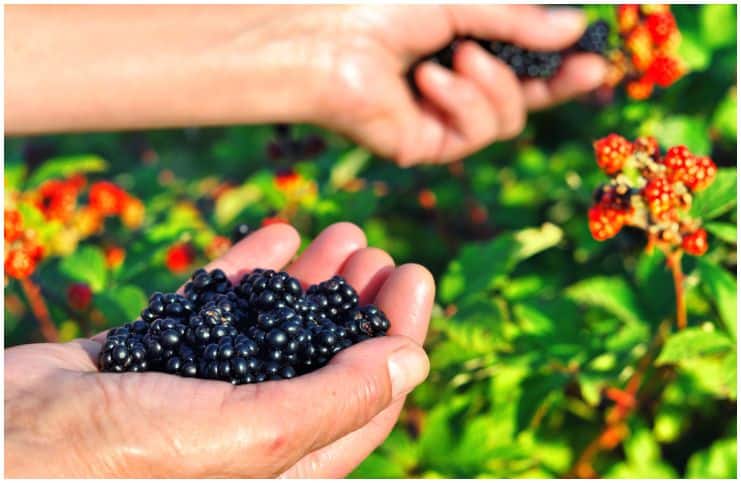Mulberry
It a berry that comes from a tree belonging to the Moraceae family. It is a dark skin colored delicious fruit that in the present day is widely cultivated in regions like the Middle East, Southern Europe, Indian Subcontinent, and Northern Africa.
The black version has been grown in Europe from before the Roman age and is native to western Asia.
The red type is native to the eastern US and the Gulf Coast. Lastly, the white variety (scientific name – Morus alba) is native to central and east China.
Chinese herbal medicine has used this fruit for millennia to treat a variety of conditions, like – type 2 diabetes mellitus, heart disease, arthritis, and anemia.
Nutrition Facts
It is a good source of important nutrients, including – vitamin A, vitamin E, iron, manganese, magnesium, protein, dietary fiber, phosphorus, riboflavin, folate, and potassium.
Each cup of raw berries contains about 60 calories, therefore, they fit into calorie-controlled and weight-loss diets.
Health Benefits
Cardiovascular System
They have a positive effect on blood circulation as well as lower your blood pressure, making you less susceptible to strokes, blood clots, according to the 2008 study published in the “American Journal of Clinical Nutrition.”
Antioxidant Properties
These berries are an excellent source of resveratrol, a potent antioxidant that helps lessen the damage caused by free radicals. Free radicals may be formed from the environment and through natural human physiological processes.
Free radicals steal electrons from other molecules (like – proteins, fats, cell membranes, and DNA) and alter the fundamental structure of the affected molecule.
Also, these fruits contain vitamin E and vitamin C, which protect the human body against the negative effects of free radicals due to their antioxidant properties.
Good For Type 2 Diabetics
More than 86 million American adults have prediabetes and another 30 million diabetes.
The leaves of these berries have fantastic health effects, especially on reducing glycemia levels, hence, they help to maintain healthy blood sugar levels.
In addition, according to research, these leaves contain protein (about 22 percent), are caffeine-free, and are packed with B-complex vitamins.
Improves Vision
Zeaxanthin is a carotenoid mostly found in dark leafy greens, such as – kale, spinach, collard greens, broccoli, and turnip greens.
It is an eye vitamin that protects the eyes against the damaging effects of UV light on the skin. According to studies, the more zeaxanthin you have in your eyes, the fewer chances you have to deal with vision problems.
Side Effects
This fruit has no side effects, however, supplements containing extracts from it have some side effects, like – gas, bloating, vomiting, constipation, or diarrhea.
Blackberry
This fruit belongs to the Rubus genus in the Rosaceae family and has been used for its medicinal and nutritional values for more than 2000 years.
It was a favorite food of early European settlers and now it grows naturally throughout much of the US.
It has a sweet, tart flavor, making it a perfect addition to fruit smoothies or salads.
Nutrition Facts
It is a good source of riboflavin, folate, niacin, iron, calcium, vitamin C, vitamin K, phosphorus, magnesium, zinc, potassium, and vitamin A (in the form of beta-carotene).
Moreover, it is an excellent source of phenolic flavonoid phytochemicals, including ellagic acid, quercetin, anthocyanins, tannin, cyanidin, gallic acid, catechins, pelargonidin, salicylic acid, and kaempferol.
More importantly, these fruits are virtually fat-free, low in calories (100 g provide just 43 calories), high in dietary fiber (that prevents constipation, making bowel movement easier to manage), and rich in nutrients, thus, they are an excellent choice for anyone trying to lose or maintain weight in a healthy manner.
Health Benefits
Prevents Blood Clots
Just one cup of raw berries provides around 29 mg of vitamin K, which is more than 33 percent of the daily recommended intake.
Vitamin K is essential for proper blood clotting and stopping the hardening of arteries (a condition also referred to as arteriosclerosis) by preventing the buildup of LDL cholesterols.
Anthocyanins
This fruit contains remarkable levels of anthocyanins (about 200 mg/100g) that work as antioxidants that can protect the human body from many types of diseases resulted from oxidative damage.
Be aware that these berries are best consumed in their natural state to get the full antioxidant benefits.
Rich In Vitamin C
Just one cup of raw berries has approximately 30.2 mg of vitamin C, which is about fifty percent of the daily recommended intake.
This vitamin is important for preventing cell damage from free radicals, repairing cells, and healing wounds. In addition, vitamin C is responsible for the formation of collagen, the main protein in the connective tissue.
Moreover, the regular consumption of these fruits helps in skin cell renewal and protects the skin against damaging UV rays.
Side Effects
There are no known side effects.
Mulberry vs Blackberry – Which Have A Better Nutritional Profile?
These fruits, while they are quite different in taste, are similar in appearance and nutritional profile, however, blackberries are better regarding their fiber, vitamin K, and manganese content.
Images credit – Shutterstock
READ THIS NEXT: Honeydew Melon – Health Benefits
Resources http://care.diabetesjournals.org/content/30/5/1272 https://www.ncbi.nlm.nih.gov/pmc/articles/PMC5321430/
